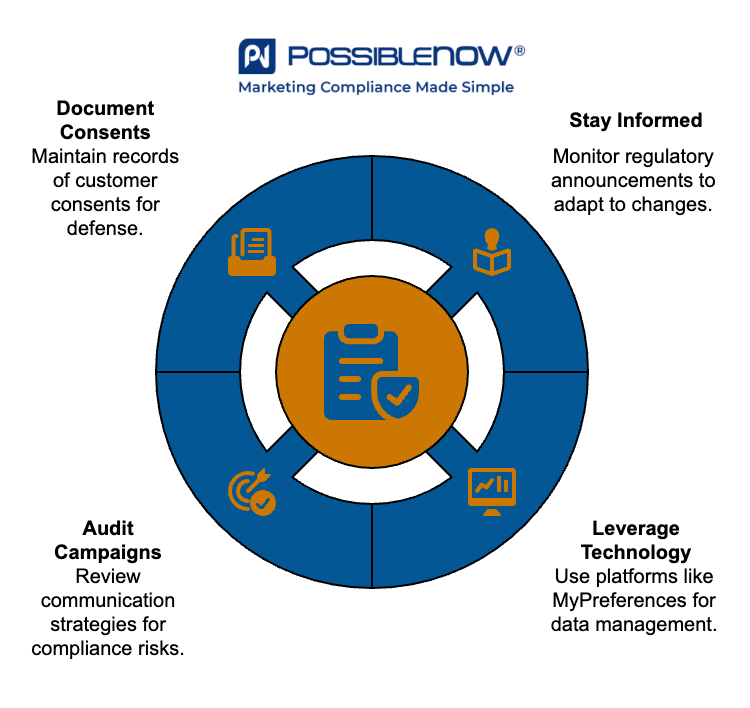Resource Center
Are There Special Compliance Rules During a State of Emergency?
Type: Blog
Topic: Do Not Call Solution

Yes, special compliance rules often apply during a state of emergency. Both federal and state regulations may impose unique requirements for businesses, particularly concerning marketing communications. For instance, the Federal Communications Commission (FCC) may enforce restrictions to protect consumers from predatory practices during emergencies. Similarly, some states temporarily adjust regulations to prevent misuse of sensitive situations.
For businesses conducting outreach, such as phone calls, emails, or text campaigns, understanding and adhering to these specific requirements is critical.
PossibleNOW’s consent management platform and Do Not Call compliance solutions are designed to adapt seamlessly to these regulatory shifts. By centralizing consents and preferences, businesses can maintain compliance while communicating effectively with their audience.
Getting Started is Just a Call Away
How State of Emergency Declarations Impact Marketing Regulations
When a state of emergency is declared, regulations around marketing and communication often change to address consumer protection concerns. For example:
- Increased Restrictions: Many jurisdictions enforce stricter rules on telemarketing, including prohibiting calls to affected areas.
- Consent Requirements: Enhanced scrutiny on obtaining and maintaining valid consumer consent often occurs during crises.
- Penalties for Non-Compliance: Failing to follow emergency-specific guidelines can result in significant legal and financial consequences.
Federal vs. State Regulations
Federal laws, such as the TCPA, often set a baseline for compliance, but states may introduce additional restrictions during emergencies. For instance, some states limit communication methods or impose specific time-of-day restrictions. Businesses operating nationally must account for these variations to stay compliant.
Specific state regulations include (but are not limited to):
- Florida: Prohibits telemarketing and autodialer calls in emergency-affected areas during a declared state of emergency.
- California: Emphasizes CCPA opt-out rights and transparency for sensitive data, especially during emergency-related communications.
- New York: Restricts telemarketing in emergency zones and imposes strict rules on soliciting funds or services related to emergencies.
- Texas: Bans telemarketing in disaster zones and requires businesses offering recovery services to register and comply with anti-fraud rules.
- Massachusetts: Prohibits unsolicited telemarketing during severe weather emergencies and increases penalties for violations.
- North Carolina: Requires special authorization for solicitation in disaster zones and prohibits exploitative marketing practices.
- Alabama: Limits telemarketing on Sundays or holidays and enforces strict no-call list compliance, even in emergencies.
Industry-Specific Considerations
Certain industries, such as healthcare, insurance, and financial services, may face heightened regulatory oversight during emergencies. These sectors often deal with sensitive customer information and require tailored approaches to communication. Tools like PossibleNOW’s MyPreferences help businesses manage consents to comply with industry-specific rules.
Best Practices for Maintaining Compliance During Emergencies

- Stay Informed: Monitor federal and state announcements regarding changes to regulations.
- Leverage Technology: Use platforms like PossibleNOW’s MyPreferences to centralize customer data, consents, and preferences, ensuring accurate adherence to changing rules.
- Audit Campaigns: Regularly review communication strategies to identify potential compliance risks and make necessary adjustments.
- Document Consents: Maintain thorough records of customer consents to provide a defensible position in case of disputes.
Navigating compliance during uncertain times doesn’t have to be a challenge. With PossibleNOW’s solutions, your business can adapt to evolving regulations while maintaining effective communication. Contact us today to learn more about safeguarding your compliance strategy.
Speak With an Expert Today
About PossibleNOW
PossibleNOW is the pioneer and leader in customer consent, preference, and regulatory compliance solutions. We leverage our MyPreferences technology, processes, and services to enable relevant, trusted, and compliant customer interactions. Our platform empowers the collection, centralization, and distribution of customer communication consent and preferences across the
enterprise. DNCSolution addresses Do Not Contact regulations such as TCPA, CAN-SPAM and CASL, allowing companies to adhere to DNC requirements, backed by our 100% compliance guarantee.
PossibleNOW’s strategic consultants take a holistic approach, leveraging years of experience when creating strategic roadmaps, planning technology deployments, and designing customer interfaces. PossibleNOW is purpose-built to help large, complex organizations improve customer experiences and loyalty while mitigating compliance risk.
-
TCPA Regulations and Compliance: Complete Guide
Type: Blog
Topic: Do Not Call Solution
-
Defining Meaningful Metrics: 6 Soft KPIs to Measure Customer Preference Collection
Type: Blog
Topic: Preference Mgmt
-
Email Preference Center Best Practices
Type: Blog
Topic: Preference Mgmt
-
The Basics of DNC Scrubbing: What Is a Do Not Call (DNC) Scrubber and Why Do You Need It?
Type: Blog
Topic: Do Not Call Solution
-
What is Consent Management, How it Works, & Why it’s Important for Data Compliance
Type: Blog
Topic: Consent Mgmt
-
Do Insurance Companies Cover TCPA Damages?
Type: Blog
Topic: Do Not Call Solution
-
8 Best Practices for Capturing GDPR Consent
Type: Webinars
-
Data Silos Cause Communication Gaps
Type: Videos
Topic: Preference Mgmt
-
Difference Between Preferences & Consent
Type: Videos
Topic: Preference Mgmt
-
Integrate Do Not Call Compliance with Preferences
Type: Videos
Topic: Preference Mgmt
-
Customer Preferences Require More Than One Flavor
Type: Videos
Topic: Preference Mgmt
-
Give Customers Opt-Down Options
Type: Videos
Topic: Preference Mgmt
-
Preference Center Organization
Type: Videos
Topic: Preference Mgmt
-
Strategic Consultants Benefited Scotiabank
Type: Videos
Topic: Industry Testimonials
-
My Call Center is Not in the US. Do I Need to Comply with US Telemarketing Regulations?
Type: Blog
Topic: Do Not Call Solution
-
How Many TCPA Violations Do I Have to Commit to Be Sued?
Type: Blog
Topic: Do Not Call Solution
-
How Does My Business Obtain a SAN Number to Access the DNC Registry?
Type: Blog
Topic: Do Not Call Solution
